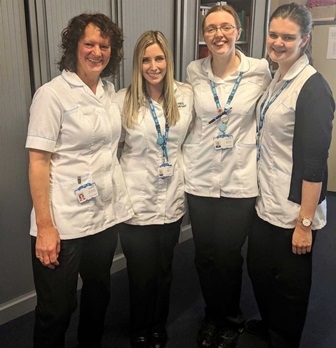It's time to take the signs of diabetes seriously this World Diabetes Day
Tuesday, November 13, 2018

People across Southport and Formby are being urged not to ignore signs and symptoms this World Diabetes Day (14 November 2018).
Diabetes is a lifelong condition that causes the blood sugar level to be too high. Across Sefton, 6,500 are classed as being 'at risk' of developing type 2 diabetes - but it is preventable.
Dr Doug Callow, GP and diabetes lead at NHS Southport and Formby CCG, said: “It's really important that diabetes is diagnosed as early as possible because it will get progressively worse if left untreated.
"Making sure you know the symptoms means that you can work to make the changes you need to, to make sure it doesn't get worse."
The signs to look out for are:
- feeling very thirsty
- urinating more frequently than usual, particularly at night
- feeling very tired
- weight loss and loss of muscle bulk
- itching around the penis, or frequent episodes of thrush
- cuts or wounds that heal slowly
- blurred vision
Not being diagnosed or not managing diabetes properly once diagnosed can lead to serious health problems - heart disease and stroke, nerve damage, problems with your feet, blindness and problems with your kidneys. In women, it can also contribute to miscarriage and stillbirth.
Dr Callow added: “Not managing diabetes properly can lead to serious complications, this is why there is lots of support for you, including our Diabetes Education Programme.”
Provided by Lancashire Care NHS Foundation Trust, ‘Diabetes and You’ is a programme for people who have been newly diagnosed with type 2 diabetes. ‘Diabetes and More’ is for people who have been living with the condition for more than a year.
These sessions are free, informal and are a great way of meeting other people who are also keen to learn more about managing their condition and are designed to make living with diabetes as manageable for you as possible.
John Bennett, 65, who was diagnosed with diabetes several months ago said: “I’m retired and I was a driver in my last job.
“I went to the GP for a 65 MOT and that’s when I learned that I had diabetes. I don’t have any symptoms and I was referred to the service via my GP.
“When I visited the service, I found them very useful and helpful. I have no complaints whatsoever. They are very clear, they don’t patronise you and they tell you what is what when it comes to diabetes. The clarification is perfect.
“The service gives you a lot of confidence in dealing with diabetes and I would recommend other people with diabetes to visit the Diabetes Education Team and ensure they get help early on.”
Erin Foley from Lancashire Care NHS Foundation Trust’s Diabetes Education Team said: “Locally 9 out of 10 people diagnosed with diabetes have Type 2 diabetes.
“With support to maintain a healthy diet, keep active and keep to a healthy weight, people with diabetes can stay well and reduce their risks of long-term health problems. Diabetes can have an impact on the health of the whole family. So, families have a key role to play in supporting lifestyle changes.
“Learning how to self-manage diabetes is a must for anyone who has the condition. People with diabetes are at risk of developing health problems that include renal disease, blindness, cardiovascular disease and lower limb amputations, and it is because of this that we hold regular diabetes sessions to help people with diabetes to understand their condition better and how to successfully manage it to keep themselves well.
“The sessions are free and extremely useful in learning how to live with diabetes.”
The courses are held in various venues across Southport and Formby and at various timings throughout the day, including evenings and weekends. They’re designed to make living with diabetes as manageable for you as possible.
To find out more about these programmes or to book directly onto a course, contact the Diabetes Education Team on 01704 387271 or email lcn-tr.diabeteseducation@nhs.net
To find out more about diabetes, visit the NHS Choices website: www.nhs.uk/conditions/diabetes





